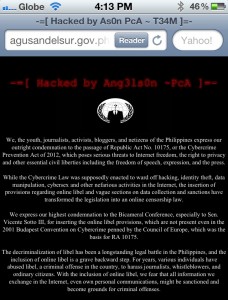Agusan Sur gov’t website latest to be hacked by cybercrime law ‘hacktivists’

The hacker with the nickname “Ang31s0n” did not mention any affiliation with “Anonymous Philippines,” which defaced a string of government and non-government institutional websites last Wednesday and Thursday nights.
Instead of the official homepage, the website contained a statement with the music from British rock band Queens “I Want to Break Free” and a link to website change.org, where an online petition letter against the anti-cybercrime law was posted. The same statement was posted on the hacked provincial government website.
“The Cybercrime Prevention Act of 2012 poses serious threats to Internet freedom, the right to privacy and other essential civil liberties including the freedom of speech, expression and the press,” the statement said.
“With the government taking Internet freedom away, the Filipino people will not just stand and watch. Internet freedom is a human right, and we will defend it both in the virtual and the real world,” it said.
This is the full content of the petition letter:
“Petition Letter
“Greetings,
“We, the youth, journalists, activists, bloggers, and netizens of the Philippines express our outright condemnation to the passage of Republic Act No. 10175, or the Cybercrime Prevention Act of 2012, which poses serious threats to Internet freedom, the right to privacy and other essential civil liberties including the freedom of speech, expression, and the press.
“While the Cybercrime Law was supposedly enacted to ward off hacking, identity theft, data manipulation, cybersex and other nefarious activities in the Internet, the insertion of provisions regarding online libel and vague sections on data collection and sanctions have transformed the legislation into an online censorship law.
“We express our highest condemnation to the Bicameral Conference, especially to Sen. Vicente Sotto III, for inserting the online libel provisions, which are not present even in the 2001 Budapest Convention on Cybercrime penned by the Council of Europe, which was the basis for RA 10175.
“The decriminalization of libel has been a longstanding legal battle in the Philippines, and the inclusion of online libel is a grave backward step. For years, various individuals have abused libel, a criminal offense in the country, to harass journalists, whistleblowers, and ordinary citizens. With the inclusion of online libel, we fear that all information we exchange in the Internet, even own personal communications, might be sanctioned and become grounds for criminal offenses.
“We also fear the enactment of Section 19 of RA 10175, which effectively makes the Department of Justice an all-encompassing ‘Internet superpower.’ Section 19 of RA 10175 states, ‘When a computer data is prima facie found to be in violation of the provisions of this Act, the DOJ shall issue an order to restrict or block access to such computer data.’ Under such provision, the DOJ can take down websites that it suspects – upon initial observation – to be violating RA 10175.
“The Cybercrime Prevention Law is, in fact, far worse than the ‘Stop Online Piracy Act’ and the ‘Protect IP Act,’ that were pushed in the US Congress earlier this year but failed to prosper. RA 10175 will have a ‘chilling impact’ to bloggers, online journalists, advocacy groups and normal netizens, as any website can be shut down with accusations of infringement without due process.
“It is also alarming that the new law was seemingly drafted with the mindset that crimes committed online is graver than those committed in the real world. Due to the vague provisions in RA 10175, even commenters and those that retweet libellous materials can also be incriminated.
“As several provisions in this law are clearly unconstitutional, we strongly urge the government to junk this legislation and prevent the enactment of e-Martial Law. The passage of this law seemingly reflects the Aquino administration’s policy of neglect. This must be stopped, by all means.
“With the government taking Internet freedom away, the Filipino people will not just stand and watch. Internet freedom is a human right, and we will defend it both in the virtual and the real world.
“For Internet freedom,
“[Your name].”